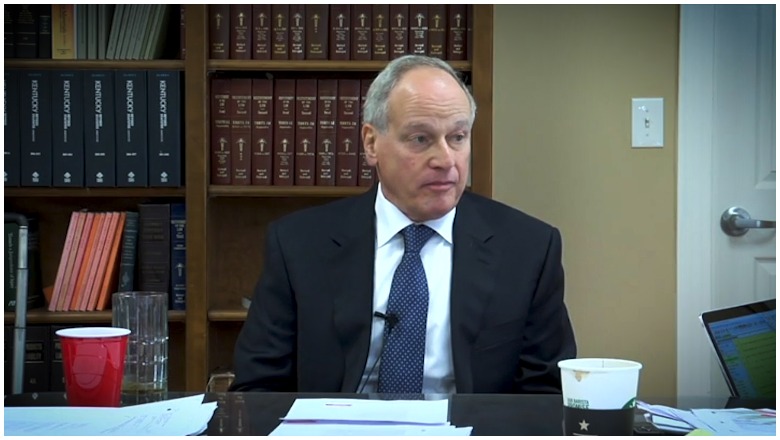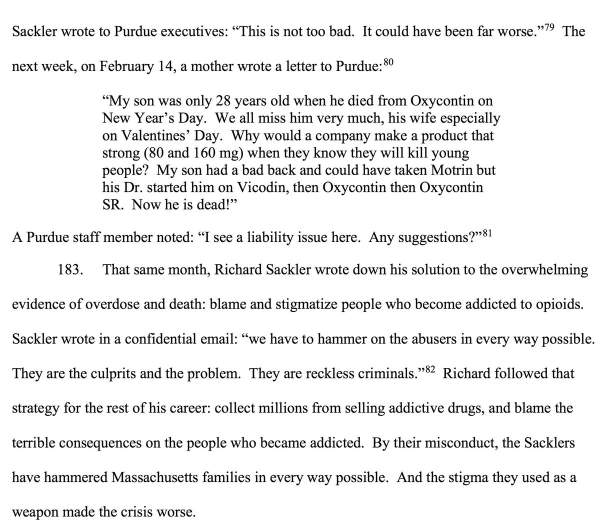
ProPublica
Richard Sackler is an American billionaire and the former chairman and president of Purdue Pharma, the manufacturer of OxyContin, a drug which contributed heavily to the American opioid crisis which claimed more than 400,000 lives according to the Centers for Disease Control and Prevention.
Richard Sackler’s father, Raymond Sackler, bought Purdue Pharma in 1957 with his brother Mortimer Sackler. Richard joined the company in 1971 as “head of research and development” and “head of marketing” and became one of the key figures behind the research and development of OxyContin and subsequent marketing of the product.
The company currently has over 2,000 lawsuits against it accusing it of failing to alert doctors of the Oxycontin’s potency and urging them to overprescribe the drug while understanding its risks and addictive properties. The lawsuits have been brought by various states, cities, and counties. Purdue lawyers are currently in talks to settle all of them for a reported $10-$12 billion.
In 2007, three Purdue Pharma executives pleaded guilty in federal court to a misdemeanor of “misbranding” OxyContin the company agreed to pay over $600 million in fines and penalties as part of a plea deal. No members of the Sackler family were convicted in the case.
Despite the thousands of legal cases and mountains of litigation Purdue Pharma has faced, they have been able to keep court documents out of the public eye due to judicial secrecy orders or settlement agreements that mandate their destruction.
Earlier this year, ProPublica obtained sealed court documents that included emails and transcripts to an 11-hour testimony Richard Sackler gave to the Kentucky attorney general’s lawyers in a $24 million lawsuit with the state of Kentucky.
The video from his testimony in the Kentucky lawsuit was released on 8/27and quickly made headlines.
In the testimony, Richard Sackler said, “I don’t know” more than 100 times in response to questions. He was asked about his knowledge of the potency of OxyContin, the FDA fast-tracking OxyContin and his role in marketing the drug.
Sackler didn’t dispute what was in the emails but instead provided context and justification for what was said. Speaking on his motives for downplaying the drug’s potency despite it being twice as potent as morphine, he said Purdue didn’t want OxyContin “to be polluted by all of the bad associations that patients and healthcare givers had with morphine.”
At one point, Purdue was trying to get OxyContin classified as an uncontrolled drug in Germany so it could be more rapidly prescribed. Robert Kaiko, the developer of OxyContin, wrote to Sackler, “If OxyContin is uncontrolled in Germany, it is highly likely that it will eventually be abused there and then controlled.”
Sackler moved forward with the plan despite the warnings. When German officials eventually declared it would be classified as a narcotic, Sackler wrote to a German Purdue executive, “When we are next together we should talk about how this idea was raised and why it failed to be realized. I thought that it was a good idea if it could be done.”
When confronted with this, Sackler said “That’s what I said, but I didn’t mean it. I just wanted to be encouraging.” to the employee.
He denied any wrongdoing in the case and continues to maintain the innocence of Purdue Pharma and his role in the marketing of OxyContin.
According to Business Insider, the Sackler family is worth an estimated $13 billion. According to unsealed court documents, they made more than $4 billion from OxyContin sales from 2008 – 2015.
Richard Sackler was married to Beth Sackler but the couple has since divorced. They have three children together, Rebecca, Marianna, and David Sackler. Richard currently lives in a hilltop mansion outside of Austin, Texas in an area that is popular with tech entrepreneurs.
Here’s what you need to know:
1. His Family Has Given Millions in Donations to the Art World

STEPHANE DE SAKUTIN/AFP/Getty Images)Activists of P.A.I.N. (Prescription Addiction Intervention Now) association – created to respond to the opioid crisis – and of French NGO Aides hold banners reading “Shame on Sackler” and “Take down the Sackler name” (back) in front of the Pyramid of the Louvre museum (Pyramide du Louvre), on July 1, 2019 in Paris
The Sackler family is well known in the art community for donating millions to famous museums and art galleries from their philanthropy, the Sackler Trust. They funded the Arthur M. Sackler Gallery at The Smithsonian, the Sackler Wing at The Metropolitan Museum of Art, and the Sackler Wing of Oriental Antiquities at the Louvre. There’s also a Sackler Museum at Harvard and a Sackler Center for Arts Education at the Guggenheim.
Their involvement in the opioid crisis has caused several groups to protest at famous museums including the Guggenheim. The public pressure has led to these museums to stop accepting donations and sever ties with the Sackler family. Britain’s National Portrait Gallery gave back a $1.3 million donation from the Sackler Trust, and the Guggenheim Museum in New York and the Tate museum in London have stopped accepting donations from the Sacklers.
In addition, the Metropolitan Museum of Art and the American Museum of Natural History in New York City have reportedly stopped accepting donations from the family.
2. He Is Accused of Calling Users Addicted to OxyContin ‘Reckless Criminals’

According to court filings released in January, Sackler wanted to separate the responsible OxyContin users from what he called ‘reckless criminals’ abusing the drug.
“We have to hammer on the abusers in every way possible,” he wrote in a confidential email. “They are the culprits and the problem, they are the reckless criminals.”
The Wall Street Journal reported that in an internal email he said that “criminal addicts…being glorified as some sort of populist victim.”
In another exchange, he said that “I’ll tell you something that will totally revise your belief that addicts don’t want to be addicted. It is factually untrue. They get themselves addicted over and over again,” according to court documents.
In the same court filings, a Purdue employee brought to Richard’s attention that 59 deaths had been directly attributed to OxyContin to which he responded “This is not too bad. It could have been far worse.”
3. He Has Remained out of the Public Eye Until Now

A clip from a 1998 Purdue Pharma marketing video intended for doctors to show their patients.
Despite being president of Purdue Pharma from 1999-2003 and presiding over the massive launch of OxyContin, Richard Sackler has almost never been seen in the media. Until the recently unsealed court documents showed his testimony and emails, he had never given an on-the-record interview about OxyContin.
According to the New Yorker, during his time as President he “he never appeared at forums” and “felt no pressure to be the public face of the business.”
“I’ve had a lot of experience with Purdue over the years, in different settings, but I’ve never even seen Richard Sackler,” addiction specialist and Purdue critic Andrew Kolodny told the New Yorker. “I don’t think I’d know him if he was standing in front of me.”
4. He Disregarded Warnings from Experts on OxyContin’s Danger & Potential for Abuse, Officials Have Said
According to the New Yorker, in 2001 the then-Attorney General for Connecticut, Richard Blumenthal, now one of the state’s U.S. senators, wrote Richard Sackler to warn him about the rampant abuse of OxyContin. “I have been increasingly dismayed and alarmed about the problems and escalating abuse of OxyContin,” he said, citing overdose deaths, addiction, pharmacy robberies, and “the astonishing growth in state funding that was being used to pay for OxyContin prescriptions through Medicaid and Medicare.”
He said that OxyContin “is more powerful, more addictive, more widely sold, more illicitly available, and more publicized.” than other painkillers and urged Purdue to “overhaul and reform” it’s marketing.
Richard Sackler disregarded his recommendation and Blumenthal later filed a complaint against Purdue on behalf of the State of Connecticut. Blumenthal cited Purdue records that stated they knew in 1998 that 8-hour interval prescriptions were becoming more frequent which one Purdue employee called “very scary”. OxyContin is supposed to be given on 12-hour intervals due to its potency. Purdue allegedly advised the 8-hour schedule so that it could be prescribed more and compete with other, less potent painkillers.
As early as 1997, many benefit plans began citing abuse as a reason not to pay for OxyContin. In a 1997 email from unsealed court documents, Sackler urged his employees to counter this resistance and that for insurance companies “ ‘addiction’ may be a convenient way to just say ‘NO.’”
5. He Was Portrayed by Famous Actors On ‘Last Week Tonight with John Oliver’
Earlier this year after Sackler’s testimony in the Kentucky lawsuit was released by ProPublica, the HBO show Last Week Tonight dedicated a segment to the opioid crisis, specifically Purdue Pharma, shining a light on their legal troubles and highlighting segments from the court documents.
“I know that as punishments go, getting to keep $1.3 billion doesn’t sound all that f****** bad,” Oliver admitted. “But keep in mind that these people have infinite money, and seem to enjoy nothing more than using it to purchase social status. So, not getting to put their name on things may be a real punishment to them. But I would argue that that should only be half of it.”
In order to bring more attention to Purdue’s role in the opioid crisis, the show re-enacted Sackler’s testimony.
This was before the video came out, so they decided to portray Sackler with famous actors that included Michael Keaton, Bryan Cranston, Michael K. Williams, and Richard Kind who acted out his testimony. Since the video wasn’t available, many of the actors took creative liberties with their re-enactments, including Michael Keaton eating a Mayonnaise heavy turkey sandwich.
“The point here is,” Oliver concluded, “Richard Sackler’s deposition should not be something that Purdue gets to bury, like it’s buried so many other things over the years.”
READ NEXT: Watch the Final Trailer for “Joker”